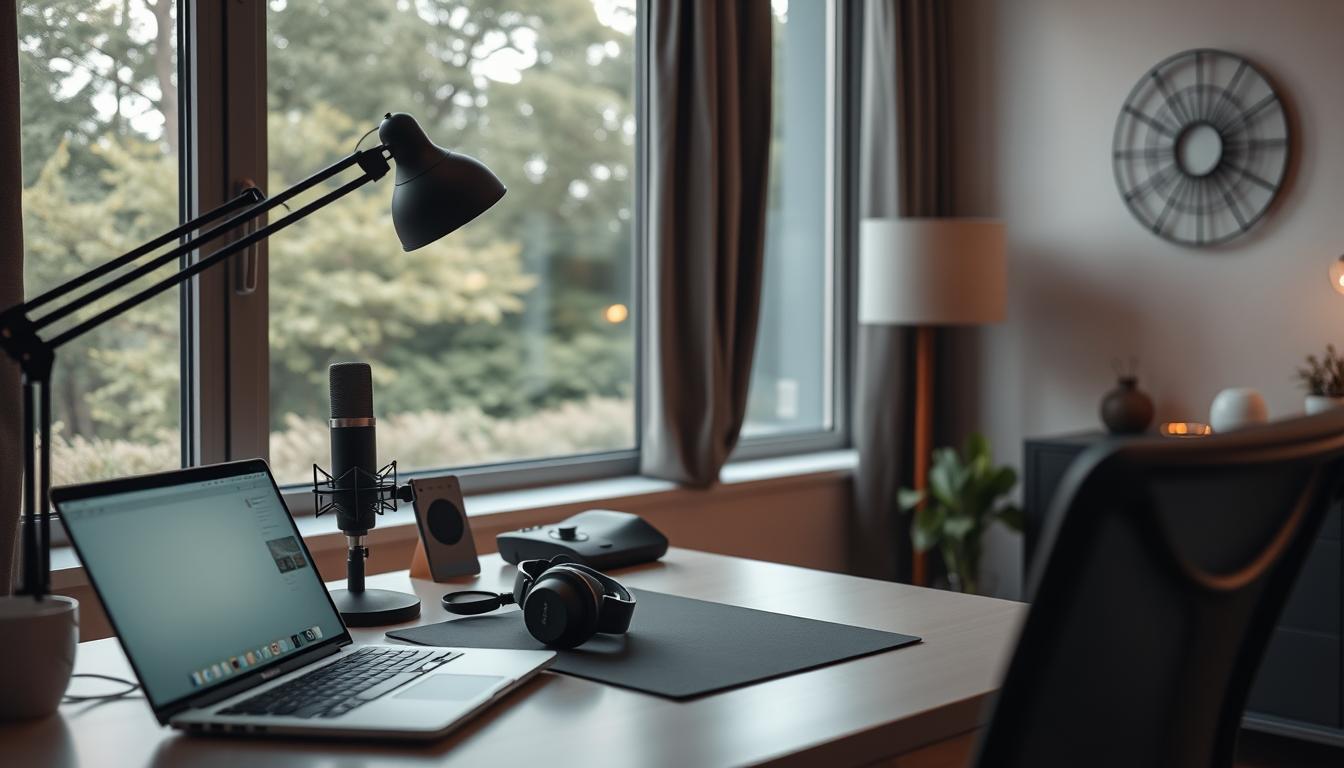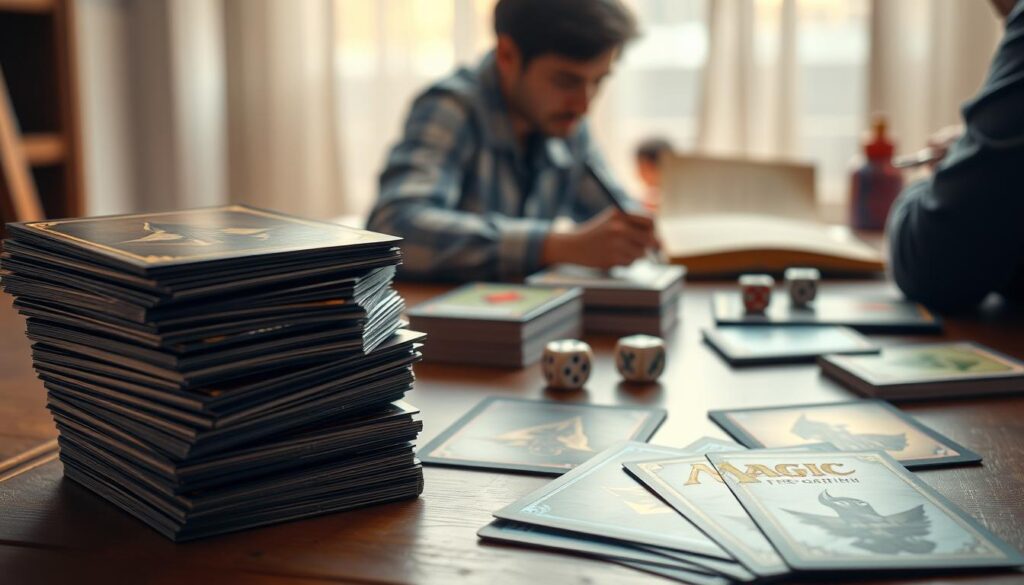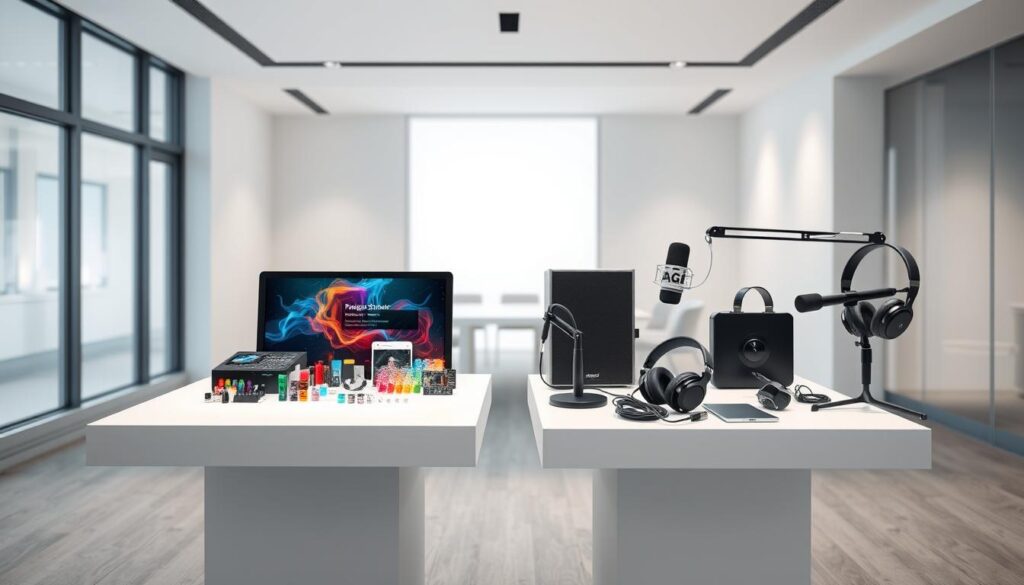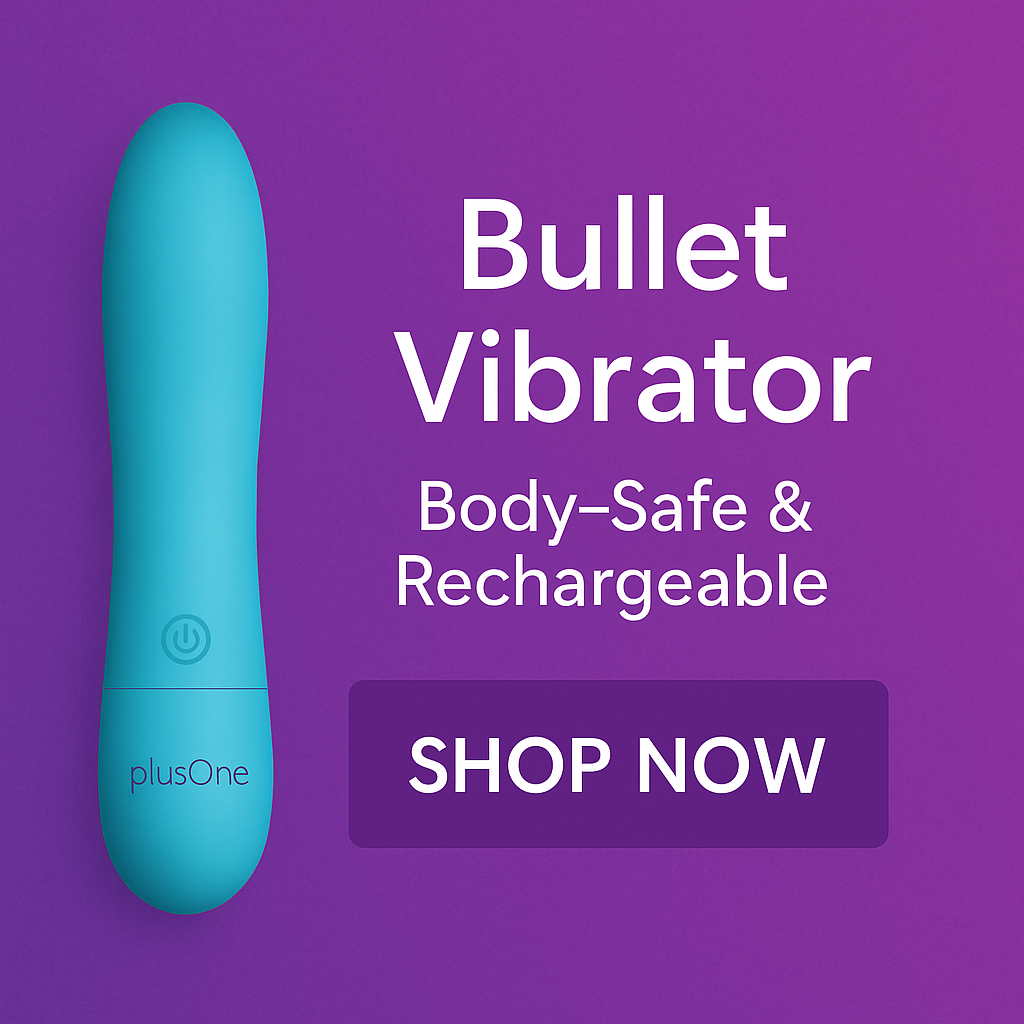
Starting a new hobby like Magic: The Gathering or podcasting can feel overwhelming. That’s where pre-built solutions shine. Designed for simplicity, these packages eliminate guesswork so beginners can focus on what matters: learning and enjoying their new passion.
Magic starter kits include everything needed to play right away—cards, rules, and strategy guides. Similarly, podcast bundles come with microphones, editing software, and setup tutorials. Both options prioritize ease of use, letting users skip hours of research.
Affordability is another perk. Instead of buying individual items, newcomers get curated tools at a budget-friendly price. No hidden costs or compatibility issues—just plug-and-play convenience.
These products also save time. Whether hosting a podcast or battling in Magic, users can start immediately. Detailed instructions and ready-to-go components mean less frustration and more fun.
Key Takeaways
- Pre-built kits simplify entry into hobbies like gaming and podcasting.
- Components are curated for immediate use, reducing setup time.
- Affordable pricing makes high-quality tools accessible to beginners.
- Guides and tutorials included in kits accelerate the learning process.
- Compatibility between items ensures a seamless experience.
Introduction to Starter Kits and Bundles for Newcomers
Newcomers often face a steep learning curve when exploring hobbies like Magic: The Gathering or podcasting. Curated packages flatten this path by offering pre-built tools tailored for immediate use. These sets eliminate the stress of researching individual components, letting beginners dive straight into the action.
Magic: The Gathering kits, for example, provide ready-to-play decks with balanced cards and rulebooks. Similarly, podcast bundles include microphones, editing software, and step-by-step guides. Both options work seamlessly for offline sessions or digital platforms, adapting to modern preferences.
One major advantage? You won’t need extra purchases. Everything required comes in one box—no compatibility headaches or surprise costs. As one satisfied user noted, “It’s like having a mentor packaged with your gear.” This approach paves the way for instant enjoyment without technical hurdles.
These solutions prioritize simplicity. Whether hosting a podcast duel or battling in Magic, setup time shrinks from hours to minutes. Detailed tutorials accelerate learning, while quality components ensure lasting value.
What Makes Starter Kits an Ideal Entry Point?
Diving into a complex hobby can feel like solving a puzzle without all the pieces. Pre-assembled sets solve this problem by delivering tools designed for instant engagement. For example, Wizards’ data reveals their Magic: The Gathering products include playable decks, tokens, and guides—no prior knowledge required.
Explaining the Simplicity of Ready-to-Play Products
These sets remove the need to research or build from scratch. Each box contains balanced decks, rulebooks, and accessories like life counters. New players skip hours of deck-building and jump straight into gameplay. One user described it as “unboxing confidence”—everything works together seamlessly.
| Feature | Starter Set | Individual Purchase |
|---|---|---|
| Setup Time | 5 minutes | 2+ hours |
| Cost | $15-$25 | $40+ |
| Guides Included | Yes | No |
Benefits for Beginners in the US Market
In the U.S., these products prioritize affordability and accessibility. Most boxes cost less than a video game, making them budget-friendly. Stores like Target and Amazon stock them widely, so availability isn’t an issue.
Digital integration codes add extra value. Players unlock online versions of their decks, blending physical and digital play. This dual approach helps newcomers learn faster while connecting with larger communities.
Overview of Best Starter Kits and Bundles
Entering a new hobby can feel like stepping into uncharted territory. Curated packages bridge this gap by combining essentials that work right out of the box. Whether diving into card games or audio creation, these selections cut through confusion with user-friendly designs.
Magic: The Gathering Arena Starter Kit stands out for its dual decks and digital codes. New players get physical cards plus online access—a perfect bit of modern flexibility. Podcast options like the Smartphone Recording Bundle include lavalier mics and editing apps, letting creators record anywhere.
“The guide walked me through setup in 10 minutes. No guesswork—just pure fun.”
Below is a quick comparison of popular choices:
| Product | Key Features | Setup Time |
|---|---|---|
| Magic Arena Kit | 2 decks, online codes, rulebook | 5 minutes |
| Podcast Smartphone Bundle | Mic, pop filter, app tutorials | 15 minutes |
| Spellslinger Edition | Pre-built decks, tokens, strategy tips | 7 minutes |
Affordable pricing remains a priority. Most options cost less than a dinner for two, making exploration budget-friendly. Guides simplify early challenges, while bundled tools save time otherwise spent hunting for compatible gear.
Variety ensures there’s something for every interest. From fantasy battles to interview podcasts, these sets offer every bit of help newcomers need. They’re not just products—they’re launchpads for mastering new skills.
Key Features of Magic: The Gathering Starter Kits
Jumping into Magic: The Gathering doesn’t require a magic spell—just the right starter kit. These boxes pack everything needed to play, learn, and enjoy the game without guesswork. Let’s explore what makes them a smart pick for new players.
Understanding Deck Composition and Pricing
Every kit includes two 60-card decks ready for battle. These feature a mix of creature types, spells, and lands balanced for fair play. For example, the Final Fantasy Starter Kit adds foil cards and themed tokens, giving extra flair without complicating gameplay.
Pricing stays friendly, often between $15-$25. That’s a lot less than buying singles or booster packs. You also get deck boxes for storage—a practical touch missing in most individual purchases.
| Feature | Starter Kit | Individual Cards |
|---|---|---|
| Total Cards | 120 | Varies |
| Foil Cards | 2-4 | Rare |
| Deck Box | Included | Sold Separately |
Learning Through Pre-built Decks and Guides
Rulebooks break down turn phases, card types, and winning conditions. The Arena Starter Kit pairs physical cards with digital codes, letting players practice online. One user shared, “The guide taught me more in an hour than a week of YouTube videos.”
Thematic narratives also boost engagement. Kits like Spellslinger Edition include story-driven tutorials, making complex strategies feel like adventures. This approach adds a lot of life to learning, keeping frustration low and fun high.
With clear instructions and curated decks, these products simplify the game’s depth. Newcomers grasp mechanics faster, building confidence for their first real matches. It’s a stress-free way to dive into a hobby with decades of life.
Diverse Product Options in Magic Starter Kits
Exploring Magic: The Gathering reveals a treasure trove of starter options. Whether you crave digital integration or crave thematic adventures, there’s a box tailored to your style. Let’s unpack what makes each choice unique.
From Arena Starter Kits to Spellslinger Editions
The Arena Starter Kit bridges physical and digital play. It includes two decks plus codes to unlock online versions. This dual approach lets players practice strategies on their phones before facing real opponents.
Spellslinger Editions take a different route. These focus on storytelling with themed tokens and alternate art. For example, the Draconic Domination set features dragon-themed cards and lore snippets. It’s a great way to immerse yourself in the game’s fantasy world.
Comparative Analysis of Thematic Variations
Not all boxes are created equal. Some prioritize competitive play, while others emphasize casual fun. Below’s how popular options stack up:
| Feature | Arena Kit | Spellslinger | Collector Booster |
|---|---|---|---|
| Digital Codes | Yes | No | No |
| Thematic Art | Standard | Premium | Foil |
| Price Range | $15-$20 | $25-$30 | $40+ |
Budget-conscious players often pick Arena kits for their affordability. Collectors lean toward premium editions for rare foils. Either choice provides everything need to jump into matches immediately.
Creative variations keep the game fresh. One player noted, “Switching between Spellslinger themes feels like playing five games in one.” This flexibility ensures newcomers find their perfect fit—whether they prefer quick duels or deep narratives.
Deep Dive into Magic Arena & Spellslinger Starter Kits
Modern gaming thrives on accessibility, and these two offerings redefine how players get started. Magic Arena blends physical cards with digital play, while Spellslinger delivers themed adventures. Both prioritize intuitive design, ensuring newcomers bypass complexity for pure enjoyment.
Highlights of Innovative Inclusions
The Arena kit includes codes to unlock decks on MTG Arena. This bridges tabletop battles with online matches—ideal for practicing strategies anywhere. Spellslinger kits feature alternate-art cards and lore booklets, transforming gameplay into narrative-driven experiences.
| Feature | Magic Arena Kit | Spellslinger Edition |
|---|---|---|
| Digital Integration | Yes | No |
| Thematic Cards | Standard | Premium |
| Price | $16.99 | $24.99 |
User Experience Considering Digital Integration
One reviewer noted, “Scanning the Arena code felt like opening a secret level—suddenly I could play anywhere.” This dual approach helps players learn rules through app tutorials before hosting real matches.
Spellslinger’s tactile elements—like dragon-themed tokens—keep sessions engaging without screens. Both products cater to different preferences while maintaining simplicity. As one Reddit user shared, “I didn’t need to Google anything—the guide answered every question.”
These kits prove modern gaming tools can balance tech and tradition. Whether craving digital flexibility or immersive stories, players find pathways to get started without friction.
Exploring Preconstructed Decks vs. Starter Kits
Choosing between traditional preconstructed decks and modern starter kits? Each option serves distinct needs. Classic decks focus on established strategies, while newer sets prioritize accessibility for fresh players.
Preconstructed decks often feature higher card quality for competitive formats. They include rare cards and complex synergies suited for experienced players. Starter kits lean toward simplicity—balanced decks with straightforward mechanics. One Reddit user noted, “My pre-con deck crushed at FNM, but I needed YouTube tutorials to understand it.”
| Feature | Preconstructed Decks | Starter Kits |
|---|---|---|
| Card Count | 60-100 | 60-120 |
| Complexity | Advanced | Beginner |
| Learning Guides | Rare | Always Included |
Thematic presentation differs too. Precons might showcase niche lore, while kits use universal themes. Board setup also varies—kits include tokens and life counters, whereas precons assume you own accessories.
Market segmentation plays a role. Competitive players favor precons for tournament-ready options. Casual learners prefer kits for their comprehensive guide to Magic products. Both products evolve: recent kits now include digital codes, blending physical and online play.
Ultimately, your choice depends on goals. Want to grind tournaments? Grab a precon. Learning basics? A starter kit reduces friction. As formats grow, both options carve unique spaces in the gaming world.
Magic Products: In-depth Look at Competitive vs. Casual Play

Navigating Magic: The Gathering formats can feel like choosing between a chess match and a backyard game. Some products cater to tournament grinders, while others focus on relaxed fun with friends. Understanding these differences helps players pick tools aligned with their goals.
Suitability for Limited and Commander Formats
Competitive players often lean toward Draft Boosters for Limited events. These packs prioritize card synergy and flexibility, letting players build decks on the fly. At $4 per pack, they offer high replay value but require strategy knowledge. One Reddit user noted, “Winning Friday Night Magic starts with mastering Draft Boosters.”
Casual formats like Commander thrive with preconstructed decks. The Commander Masters Precon ($60) includes powerful reprints and multiplayer-focused cards. While pricier than starter sets, its card quality supports long-term play. Newcomers appreciate its straightforward mechanics and social gameplay focus.
| Format | Product Example | Price | Learning Value |
|---|---|---|---|
| Limited | Draft Booster Box | $100-$130 | Advanced |
| Commander | Starter Precon | $20-$40 | Beginner-Friendly |
Budget-conscious players face trade-offs. Entry-level Commander decks ($20-$25) use simpler combos but lack rare cards. Competitive kits like Challenger Decks ($30-$45) include meta staples but demand rule familiarity. As one review stated, “You’re paying for either accessibility or power—rarely both.”
Three key considerations for new players:
- Competitive products emphasize card value over teaching tools
- Casual sets prioritize thematic fun and group dynamics
- Mid-range options ($30-$50) often balance learning and viability
Ultimately, your playstyle dictates the smartest buy. Want intense duels? Invest in tournament-ready kits. Prefer storytelling battles? Thematic precons deliver magic without pressure.
Product Roundup: Podcast Starter Kits for Beginners
Launching a podcast doesn’t require a studio budget. Modern tools let anyone record crisp audio using everyday devices. Whether using smartphones or USB mics, newcomers have flexible options to match their goals and space.
Smartphone-Based Recording and Affordable Entry Options
The BOYA Mini kit proves phones can deliver solid sound. This $25 package includes a lavalier mic, windscreen, and 20-foot cable. Clip it to your shirt, plug into your device, and start recording interviews or solo episodes. As one creator noted, “It turned my closet into a podcast booth overnight.”
Enhanced USB and All-Rounder Setups for Better Quality
For richer audio, USB mics like the Samson Q2U shine. This dual-output model works with computers and XLR mixers, growing with your skills. Bundles under $100 often include stands, pop filters, and editing software trials—ideal for scripted shows or music reviews.
| Feature | Smartphone Kit | USB Setup |
|---|---|---|
| Price Range | $20-$50 | $80-$150 |
| Best For | Interviews, mobility | Studio-quality narration |
| Learning Curve | 10 minutes | 1 hour |
Different formats demand unique tools. Co-hosted chats thrive with USB mics, while smartphone kits excel for field reporting. Both options save money compared to pro gear, letting creators test ideas before investing heavily.
Entry-level products balance cost and quality. The Zoom PodTrak P4 ($200) supports four guests—perfect for roundtable discussions. Meanwhile, the MOVO PodPro-T bundle adds wireless mics for dynamic recordings. These formats prove you don’t need deep pockets to sound polished.
Budget-Friendly Podcast Starter Kit Options
Creating a podcast shouldn’t drain your wallet. Affordable tools like the Samson Q2U and BOYA Mini prove high-quality audio doesn’t require premium prices. These options balance cost and performance, letting newcomers master the art of recording without financial stress.
Samson Q2U: Flexibility Meets Value
The Samson Q2U ($60) shines for its dual USB/XLR output. Beginners get crisp audio for solo shows or interviews, while the included stand and pop filter reduce background noise. One user shared, “It felt like upgrading from a bicycle to a car—effortless and professional.”
BOYA Mini: Smartphone Simplicity
At $25, the BOYA Mini kit focuses on mobility. Its lavalier mic clips to clothing, ideal for recording outdoors or during travel. The package includes a windscreen and 20-foot cable—perfect for capturing clear voices in dynamic settings.
| Feature | Samson Q2U | BOYA Mini |
|---|---|---|
| Price | $60 | $25 |
| Best For | Indoor studio sessions | On-the-go interviews |
| Included Accessories | Stand, pop filter | Windscreen, cable |
Both options deliver exceptional value. The Q2U suits creators ready to grow their setup, while the BOYA excels in portability. As the art of podcasting evolves, these tools ensure anyone can join the conversation without overspending.
Advanced Podcast Equipment Bundles for New Creators
Leveling up your podcast setup brings studio-quality sound within reach. While basic kits work for starters, advanced bundles refine every detail—from crisp vocal capture to seamless multi-track editing. These tools cater to creators ready to elevate their craft in the competitive podcasting world.
Integrated Solutions for Complex Recordings
The Zoom PodTrak P4 ($199) shines for group sessions. This portable interface supports four XLR mics and offers built-in sound pads for jingles. One user described it as “a Swiss Army knife for roundtable chats.” Its rechargeable battery makes coffee shop recordings viable.
For mobile creators, the MOVO PodPro-T bundle ($299) delivers wireless freedom. Two lavalier mics pair with a dual-channel receiver, eliminating cable clutter during interviews. The included carrying case transforms any space into a pop-up studio.
| Feature | Zoom PodTrak P4 | MOVO PodPro-T |
|---|---|---|
| Mic Inputs | 4 XLR | 2 Wireless |
| Battery Life | 5 hours | 8 hours |
| Best For | Indoor panels | Field reporting |
Essential Add-Ons for Polished Productions
Pro-level accessories bridge the gap between amateur and pro:
- XLR cables: Shielded options reduce interference during long recordings
- Shock mounts: Isolate mics from desk bumps and footsteps
- Closed-back headphones: Monitor audio without bleed-through
These tools transform raw recordings into polished episodes. As one creator noted, “Adding a $20 shock mount made my voiceovers sound like NPR.” Every upgrade compounds, helping shows stand out in the crowded podcast world.
Comparing Magic Starter Kits and Podcast Bundles

Whether casting spells or recording episodes, both hobbies share a secret: thoughtful product design lowers barriers for newcomers. Magic kits and podcast bundles treat people with similar care—offering pre-built tools that transform confusion into confidence. Let’s explore how these worlds align.
Both products prioritize simplicity. Magic sets deliver balanced decks and rulebooks, while podcast packages include mics and editing guides. This treatment ensures people spend less time troubleshooting and more time enjoying their new passion. One Reddit user joked, “It’s like training wheels for adults.”
Each serves as a platform for growth. Magic’s Arena codes let players practice digitally, while podcast apps like Anchor simplify distribution. Support materials—strategy guides or audio tutorials—accelerate learning without overwhelming users. Brands like Wizards and Samson build trust through reliable components that work right away.
| Feature | Magic Kits | Podcast Bundles |
|---|---|---|
| Setup Time | 5 minutes | 15 minutes |
| Learning Curve | Low | Moderate |
| Community Access | Local game stores | Online forums |
Your choice depends on passion. Love storytelling through cards? Magic’s lore-rich battles await. Prefer voice-driven creativity? Podcast tools offer a platform to share ideas. Both options treat people to frustration-free starts, proving great hobbies begin with the right treatment.
Tips for Selecting the Right Starter Kit for Your Needs
Finding the perfect entry point into a hobby requires matching tools to your goals. Whether diving into card games or podcasting, the right choice balances immediate usability with room to grow. Let’s explore how to make a smart pick without second-guessing.
Assessing Budget and Functional Requirements
Start by setting a clear spending limit. Many beginners base their decision on upfront cost but forget long-term value. For example, a $25 smartphone mic kit works for casual recordings, while a $100 USB setup supports future upgrades. Case studies show mid-range options often deliver better durability than bargain picks.
| Factor | Budget Option | Mid-Range Pick |
|---|---|---|
| Price | $15-$30 | $50-$80 |
| Lifespan | 6-12 months | 2+ years |
| Upgrade Potential | Low | High |
Prioritizing Quality and Learning Value
Look for kits that teach as you go. Magic’s Arena codes let players practice strategies online, while podcast bundles with editing tutorials speed up skill development. One creator shared, “The guide in my kit explained microphone placement better than any YouTube video.”
Check what’s inside the box. Do cards come with protective sleeves? Does the mic include a pop filter? These details separate rushed purchases from thoughtful investments. High-quality boxes often feature:
- Durable materials that withstand frequent use
- Clear instructions with visual aids
- Accessories that solve common beginner issues
Finally, read recent reviews focusing on real-world use cases. A product might look great online but frustrate users with missing cables or confusing apps. By balancing cost, features, and education, you’ll find a kit that grows with your skills.
Balancing Price and Quality in Starter Solutions
Choosing starter products often feels like walking a tightrope—lean too far toward low cost, and quality wobbles. But overspend, and buyers risk features they’ll never use. Striking this balance is key for gaming and podcasting newcomers who want tools that last without breaking the bank.
Affordable kits sometimes cut corners. A $15 Magic deck might lack protective sleeves, while budget podcast mics can pick up background noise. One Reddit user shared, “My first mic died after three episodes—cheap wires frayed.” Reviews highlight durability as a common problem in low-cost options.
| Feature | Budget Kit | Mid-Range Pick |
|---|---|---|
| Material Quality | Plastic components | Reinforced casing |
| Software Access | Basic apps | Pro editing tools |
| Warranty | 30 days | 1 year |
Prioritize these elements for a better experience:
- Modular designs: Look for podcast gear that works with future upgrades
- App integration: Editing apps like Audacity streamline post-production
- Community feedback: Check forums for recurring issues before buying
Smart spending means balancing immediate needs with long-term goals. A $50 USB mic outperforms smartphone kits for indoor recordings, while Magic players benefit from Arena codes that extend gameplay online. By focusing on core features rather than flashy extras, newcomers avoid the problem of buyer’s remorse.
Ultimately, the best starter solutions blend affordability with enough quality to support growth. As one creator noted, “Spending 20% more tripled my podcast’s lifespan.” With research and realistic expectations, beginners craft an experience that feels rewarding—not rushed.
Where to Buy Starter Kits and Bundles in the United States
Locating the right tools shouldn’t feel like a treasure hunt. Across the U.S., retailers stock products designed for hassle-free entry into hobbies like Magic: The Gathering or podcasting. Let’s map out where to shop smart.
Local game stores offer hands-on guidance. Many host free tutorials to explain card mechanics or microphone setups. Big-box chains like Target and Walmart provide budget-friendly options with extended return policies—ideal for testing products risk-free.
Online platforms like Amazon and eBay deliver convenience. Search filters help narrow choices by price, ratings, or themes. For example, Magic’s Final Fantasy set appears alongside podcast bundles with USB mics. Check seller reviews to avoid counterfeit items.
| Retailer | Benefits | Price Range |
|---|---|---|
| Local Game Stores | Expert advice, in-person events | $15-$40 |
| Amazon | Fast shipping, buyer protection | $20-$150 |
| Best Buy | Tech support, warranty options | $30-$200 |
Three tips for smarter shopping:
- Compare variety—some stores stock exclusive themed characters or limited-edition mics
- Subscribe to newsletters for flash sales on podcast gear or card sets
- Check affiliate partnerships (e.g., content creators often share discount codes)
Prices fluctuate weekly. A $25 Magic kit might drop to $18 during holiday sales. Online bundles sometimes include bonus digital tutorials, adding extra value. Whether browsing shelves or carts, focus on retailers that match your learning style and budget.
Conclusion
Exploring new hobbies becomes far less intimidating with pre-built solutions tailored for immediate use. Whether battling in Magic: The Gathering or launching a podcast, these curated packages shrink the learning curve through thoughtful design. Both hobbies share a common thread: quality tools that prioritize accessibility over complexity.
The key advantage lies in simplicity. For the size of investment, newcomers gain polished experiences without compatibility headaches. A couple of well-designed components—like rulebooks or editing tutorials—transform overwhelming research into plug-and-play enjoyment.
Affordability remains central. Options exist for every budget, balancing cost with features that grow alongside skills. Whether drawn to fantasy duels or audio storytelling, beginners can confidently choose tools matching their interests. With minimal setup and maximum guidance, these solutions prove that great beginnings don’t require expert-level effort.

